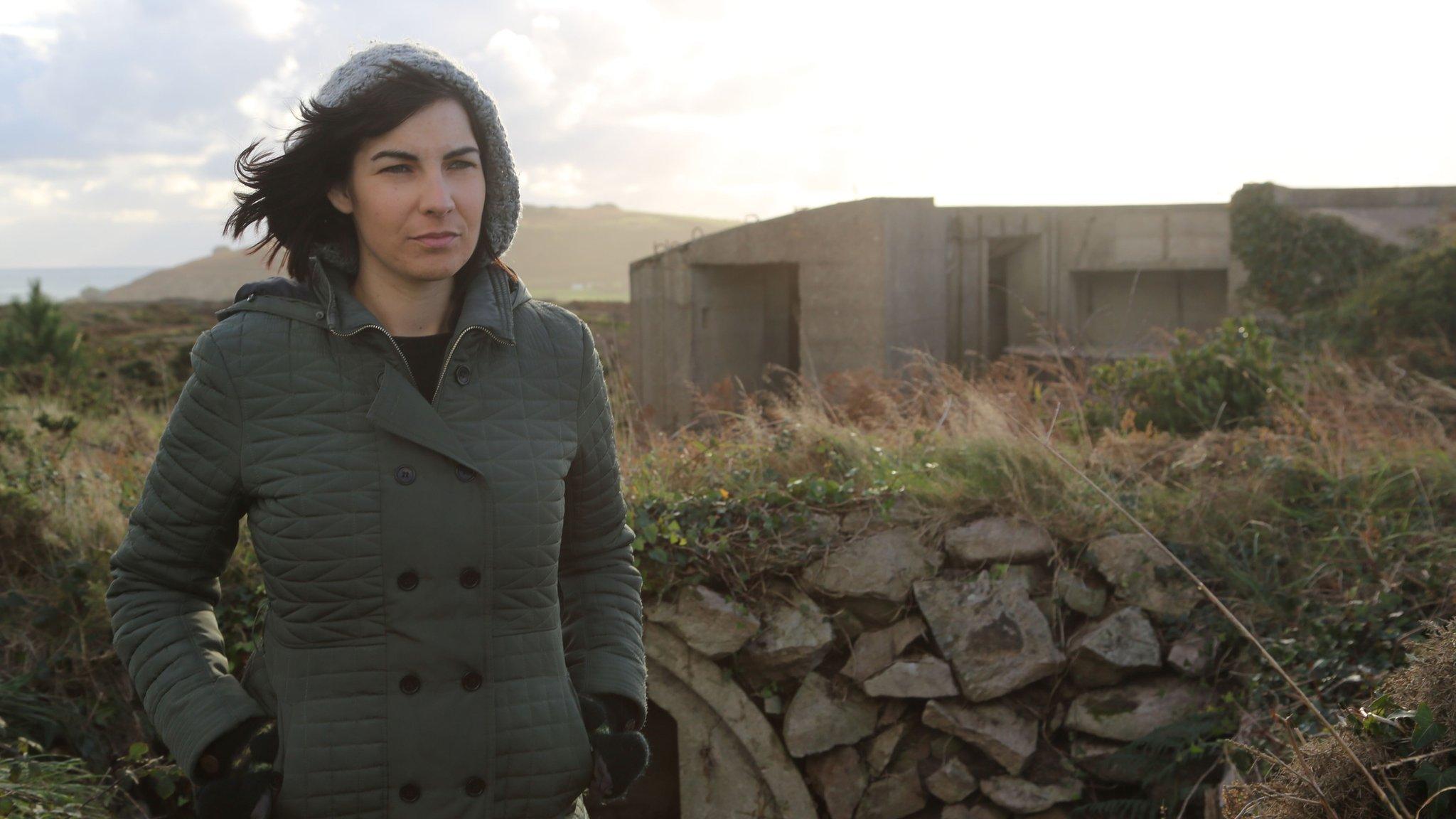Jersey celebrates 79th anniversary of Liberation
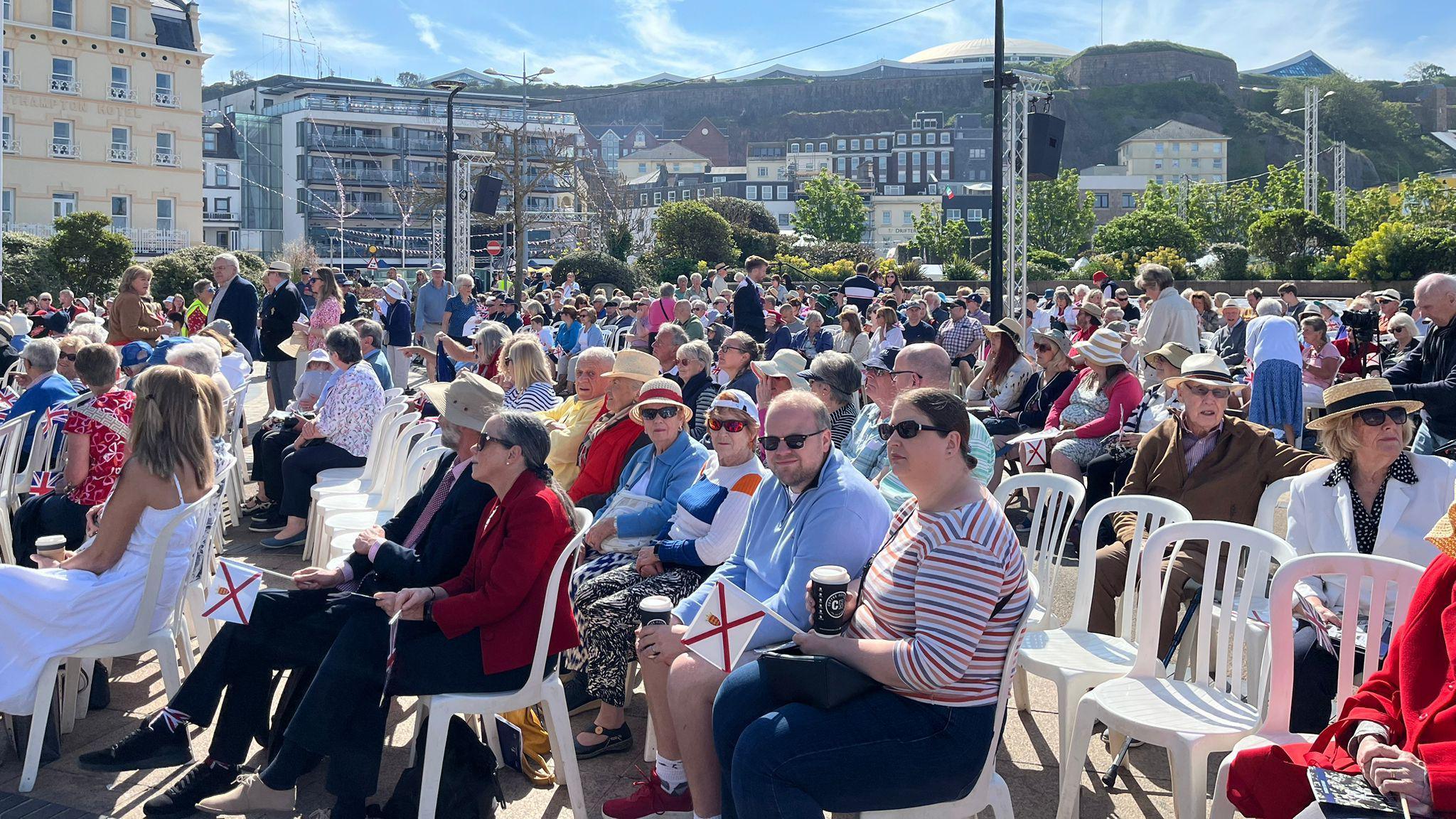
People began to arrive ahead of the procession at Liberation Square
- Published
Jersey has been celebrating its 79th Liberation Day, marking the day the island was freed from occupation.
On 9 May each year the island celebrates the end of occupation and the end of World War Two.
The Channel Islands were the only part of the British Isles to be occupied by German forces during the war.
This year's celebrations include a service of thanksgiving, music, dancing and a re-enactment of the British soldiers landing in Jersey.
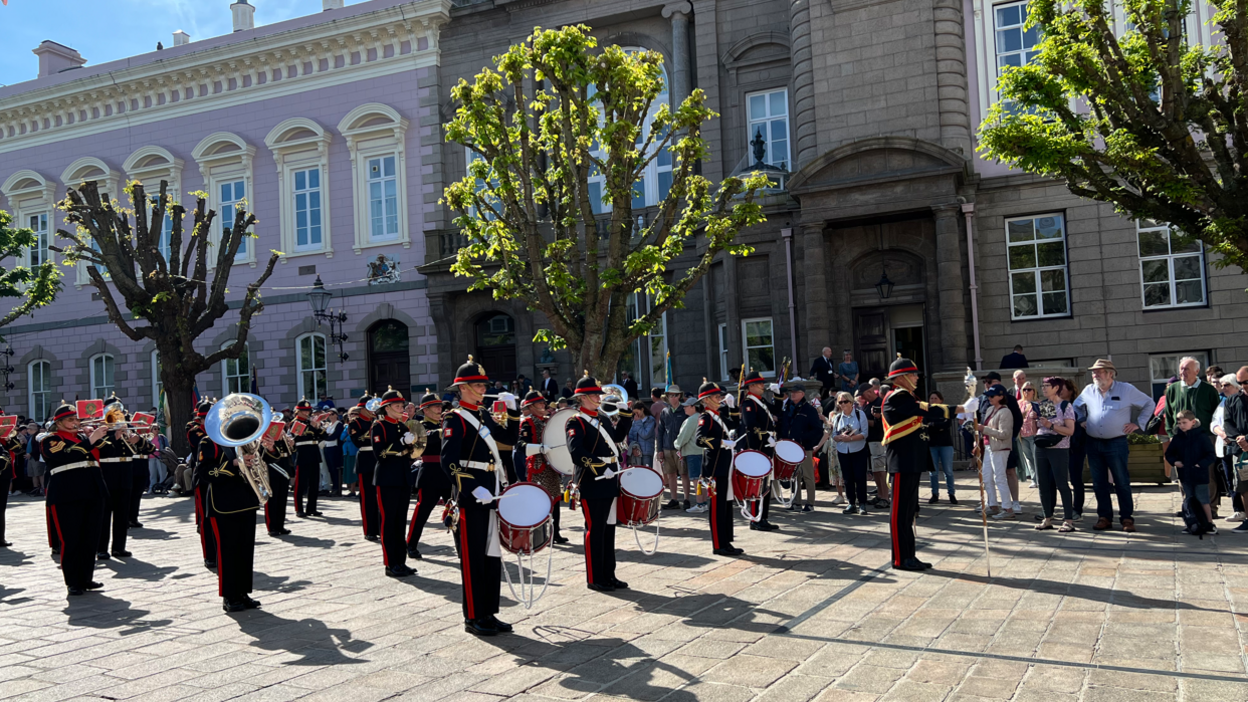
Jersey is celebrating the day the island was liberated from occupation and the end of World War Two
A special States meeting took place at 10:30 BST, where Chief Minister Lyndon Farnham delivered a Liberation Day address.
He described the stories he heard about the occupation from his family.
He said: “It was hearsay on 28 June 1940 that they remember the three of them on the beach looking for sand eels when German bombers flew over at low level - so low in fact that they could clearly see the pilot in the cockpit.
“They ran up to the perceived safety of the summerhouse and heard the bombs falling on La Rocque, and then St Helier.”
'Parents went without'
Mr Farnham said his family remembered “secretly listening to radio broadcasts from London”, and his grandparents “going without” so the children could eat.
He said: “For the rest of his days my father always ate everything on his plate which impressed me as a child - I watched with a slight bewilderment as he ate plate after plate of unappetising looking greens, ‘we would have been glad of these during the war’, he used to say.”
The meeting was followed by a procession from the Royal Square to Liberation Square, consisting of the Bailiff, the Lieutenant governor, States members and other senior officials.
The Musical Originals choir sang at Liberation Square prior to the Bailiff’s speech.
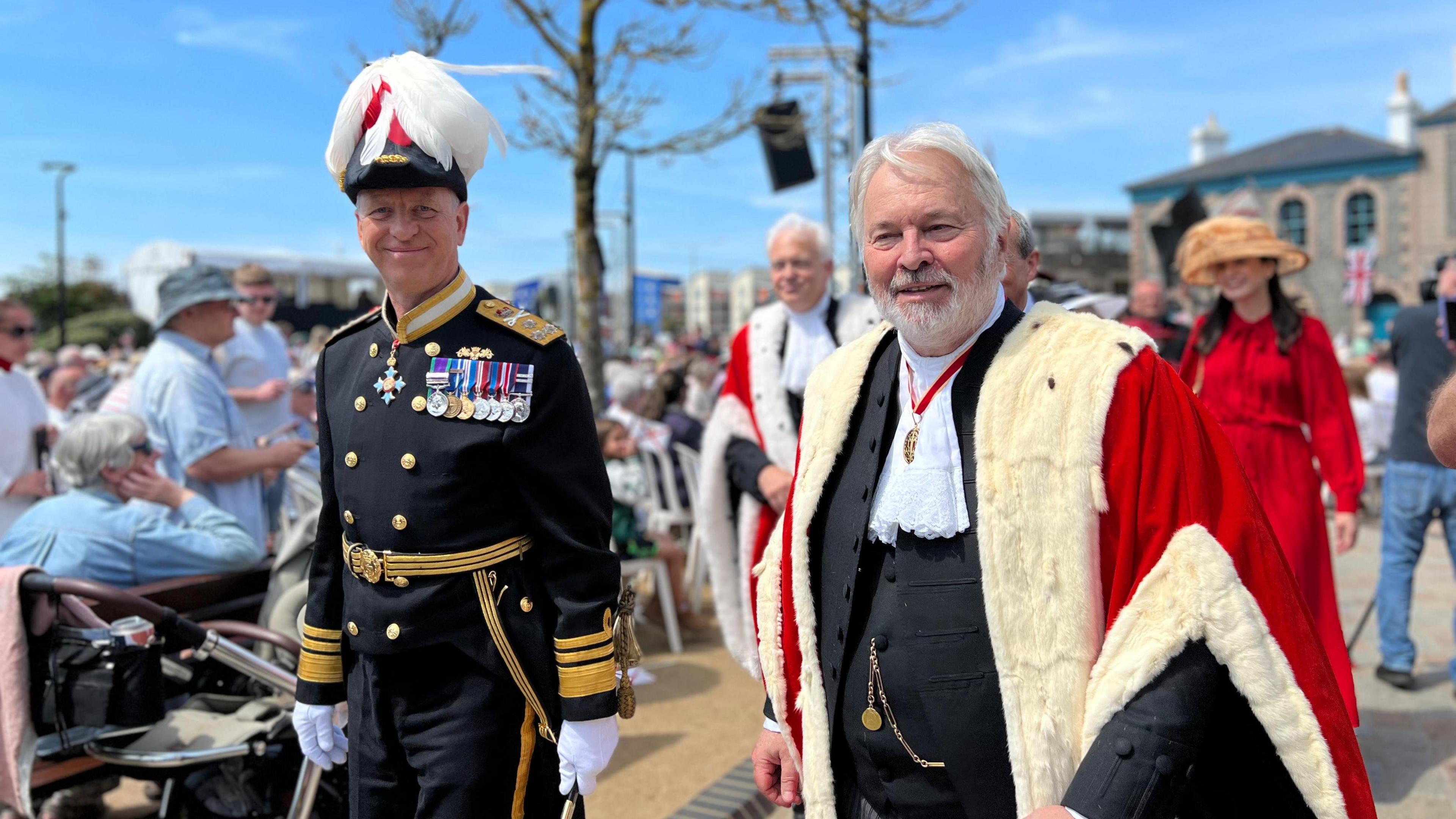
Lieutenant-Governor Vice-Admiral Jerry Kyd and Bailiff Sir Tim Le Cocq partook in the celebrations
In his speech, Sir Tim Le Cocq recognised the spirit of service in Jersey by honouring those who contributed to the island.
He said: “From the front-line workers who serve to keep us safe to the volunteers who lend a helping hand to those in need, to those wherever they are from who would not consider themselves as anything out of the ordinary, but who all embody the spirit of community in their everyday lives.
“On a lighter note even our traffic system has a unique filter in turn rule that relies upon taking turns and courtesy to keep the island moving - it's what we are.”
A union flag was also raised at the Pomme d'Or during the celebrations.
Analysis: Ammar Ebrahim, BBC Jersey political reporter
The weather provided the perfect setting for a day of joy and jubilation.
The chief minister told the States Assembly about his father's and uncle's experiences of occupation and how it disrupted their idyllic childhood.
But he said while those stories shocked and saddened, they also inspired and reminded islanders not to take our freedom for granted.
That message was one we regularly heard amongst the celebrations. Politicians and faith leaders pointing to conflicts around the world to remind islanders how precious the freedom we enjoy is.
The rendition of Beautiful Jersey was, as always, one of the most poignant and haunting moments of the day.
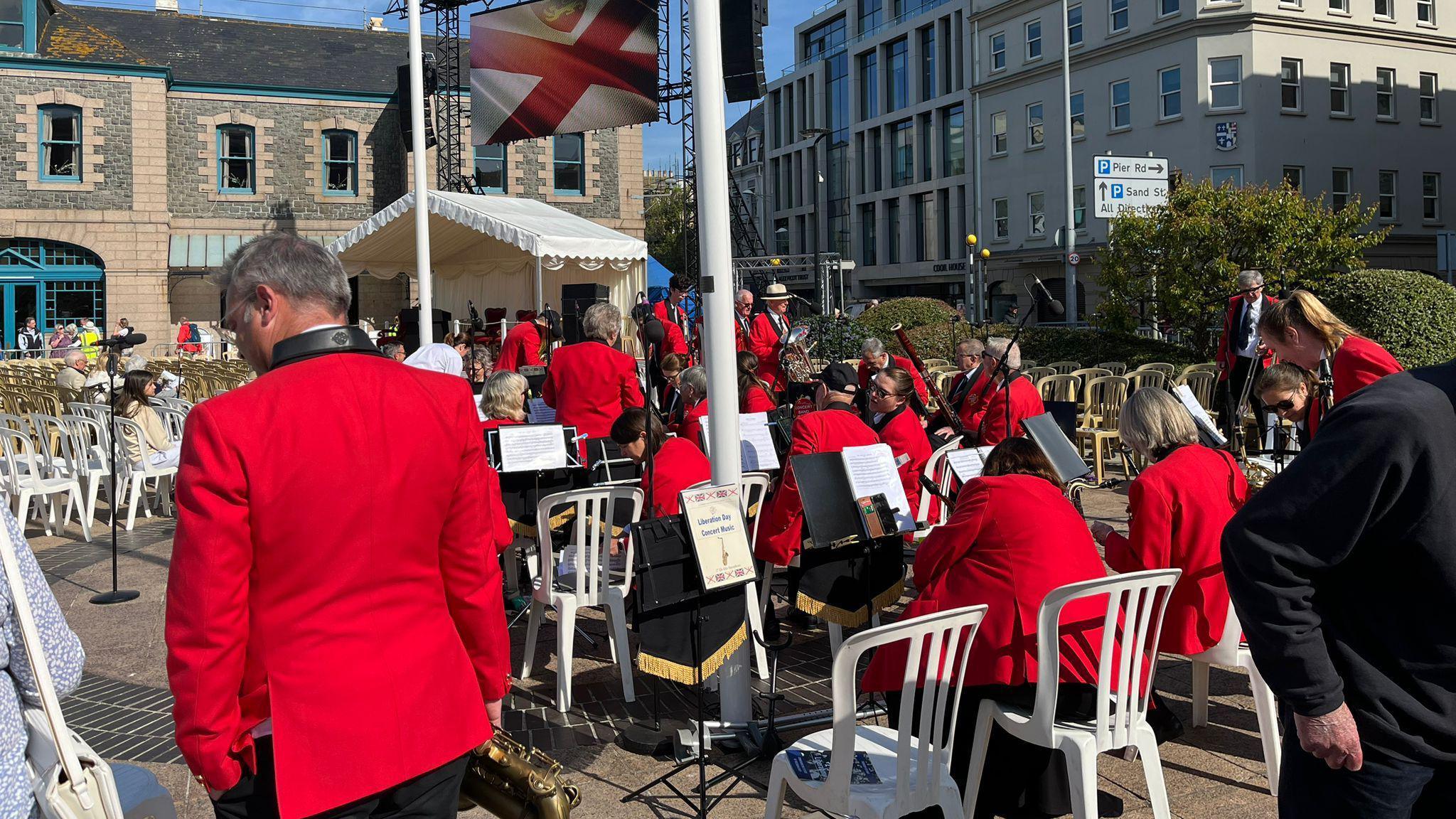
Le Ronde Concert Band performed at the event
Islanders have reflected on their experience of the occupation, including Iris Prigent, who said her late husband Gordon's work at a German slave camp in Alderney affected him for the rest of his life.
Jersey Heritage is putting special memorial stones across the island to commemorate significant islanders from the war years, including Mr Prigent.
David Perchard, a member of Le Ronde Concert Band, remembered the Liberation in 1945, when he was five years old.
He said: "I particularly remember we all went down on the Albert Pier to wait for the Tommies to come in and we were standing there waiting and the boat came through the pier heads.
"Instead of coming to the Albert Pier it went on to what we now called the new North Quay, so everybody started running up the harbour to get to the top of the harbour."
Mr Perchard said there was also another moment that stuck with him.
He said: "There was a compound with barbed wire, and being a small kid I was looking up at a guy standing there dressed in rags round his feet and I couldn't believe it.
"I remember that very, very clearly, and these were apparently Russian prisoners of war."
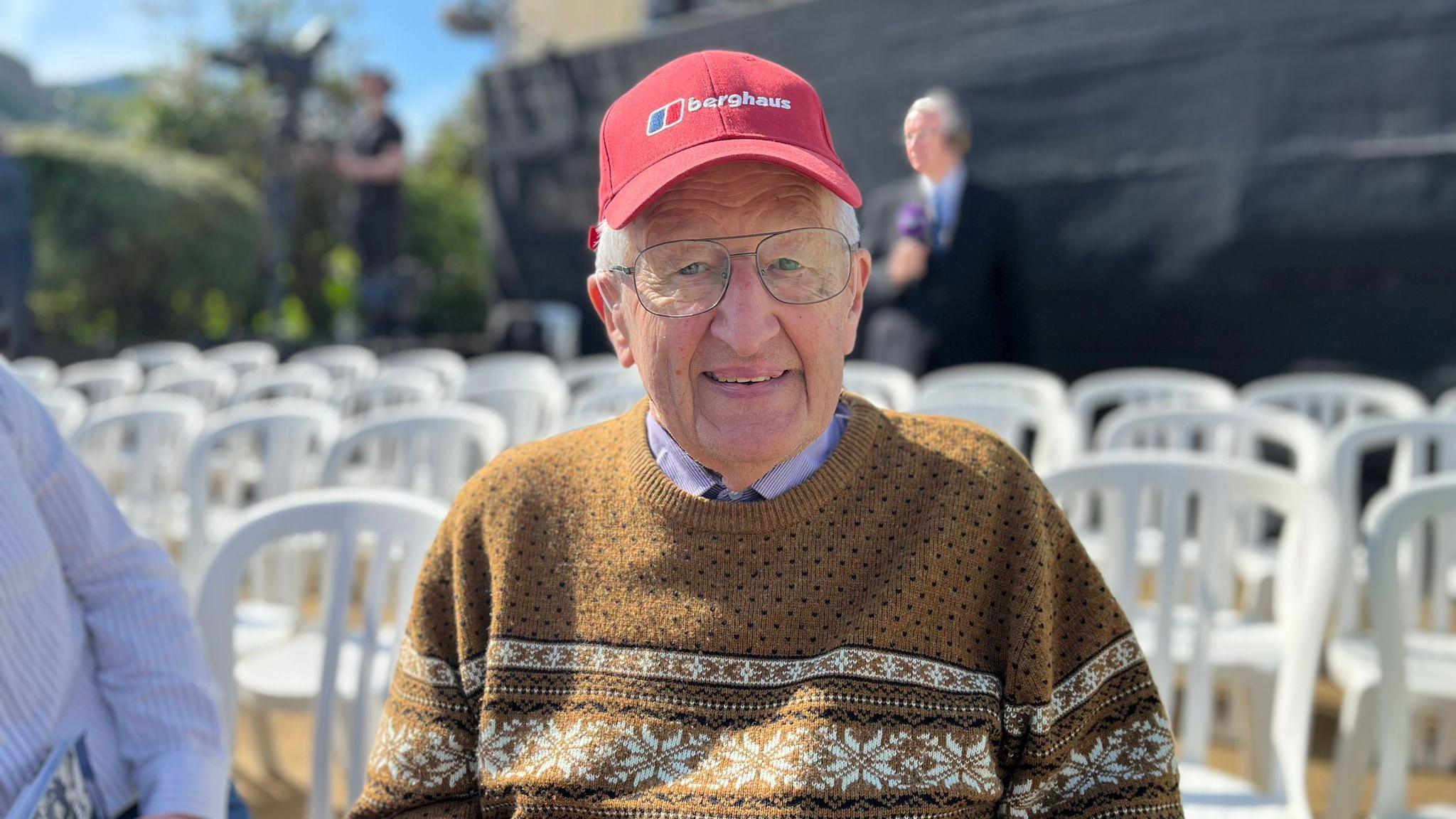
David Luce said it was "a great privilege to be here" celebrating
David Luce was 12 years old when Jersey was liberated, and said the island was put under extreme regulations.
"I have many recollections of the war years.
"I was seven when the Germans arrived in 1940, and remember the regulations that came in, not least the day when we had to ride bikes on the right hand side of the road which was an uncanny experience," he said.
'Electric with joy'
The 91-year-old said he remembered the excitement of Liberation Day.
He said: "I remember the Liberation Day when I was 12 and the excitement down here at the harbours, our soldiers were arriving in full kit and they could barely move because people were embracing them as they landed on the pier.
"They were throwing out cigarettes and they were throwing out sweets to the children as one of my cousins put it - the air on Liberation Day was electric with joy.
"It sums up just how we felt, and it's so beautiful today to have this commemoration 79 years on, it's a great privilege to be here."
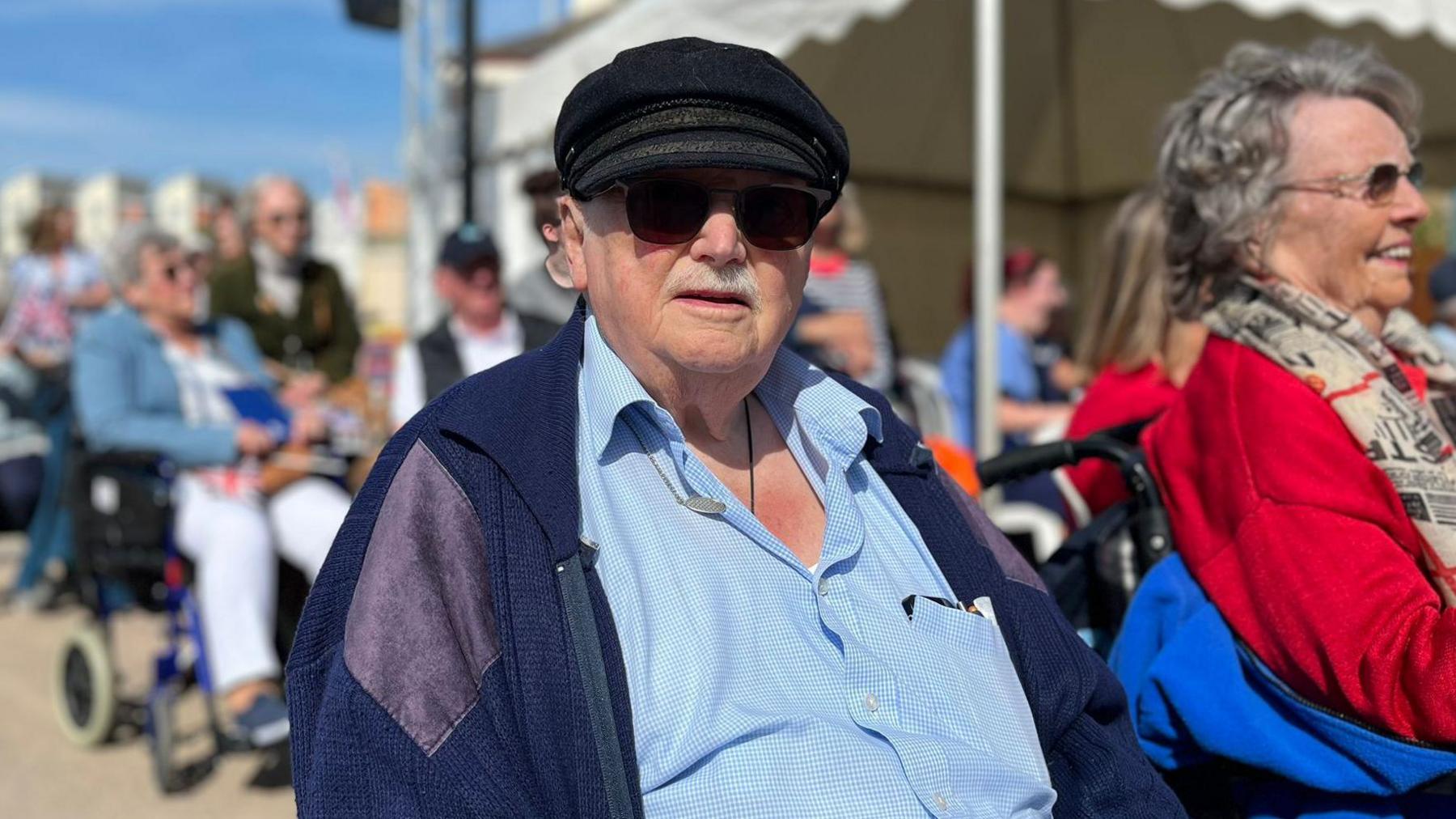
Barry Ashborn said German soldiers gave him and his father the keys to one of their vehicles on Liberation Day
Barry Ashborn said the day was "something which we'll never forget".
He said: "It was marvellous - I walked out down Colomberie and we stopped where Barclay Court is and it was all in ruins then, and the cars from the Germans were parked there.
"My father and I went over and we tried to wrench the flag off the car, and the Germans came out and said, 'here's the key, take the car'."
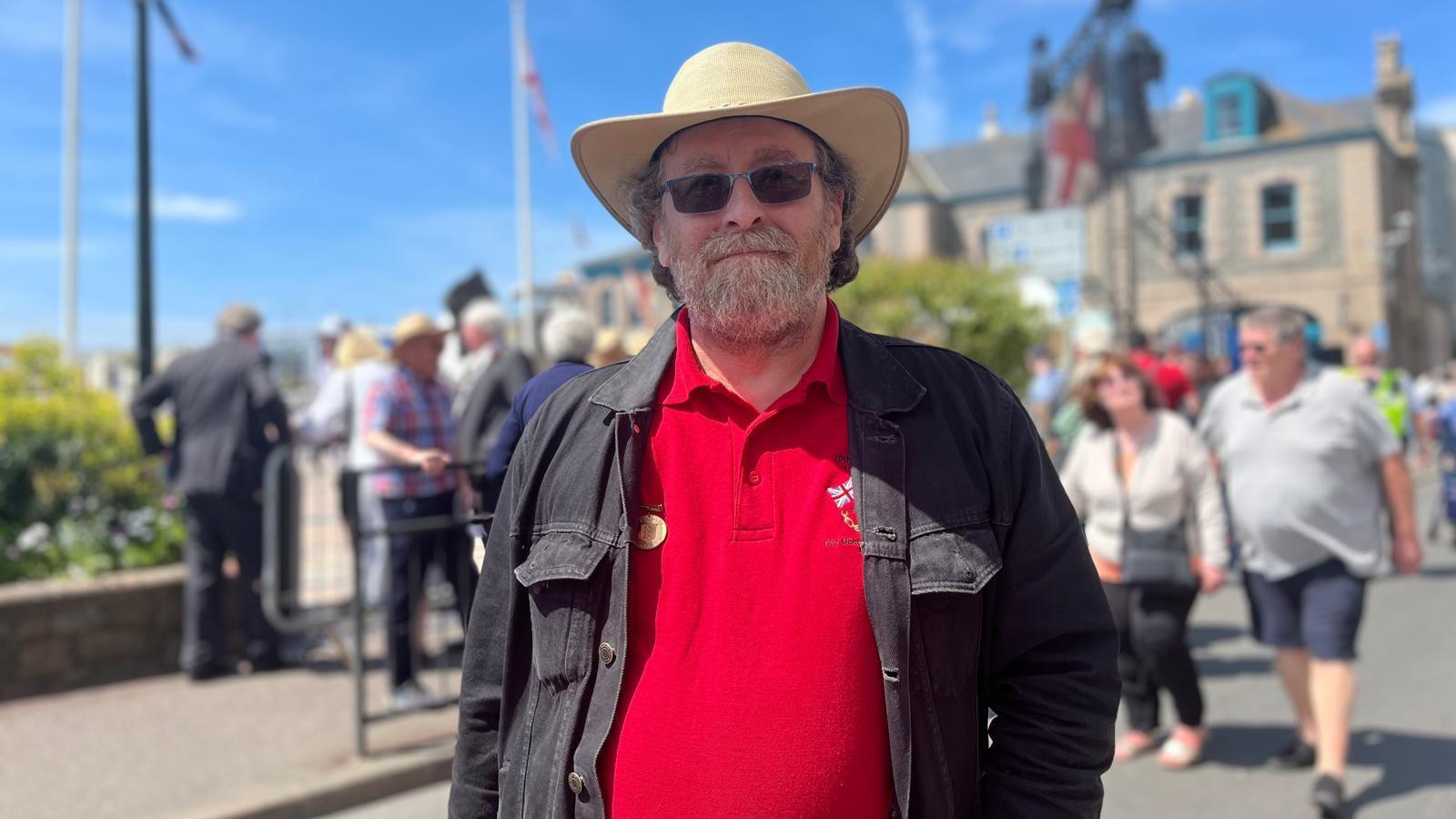
David Peck said his grandfather defied the rules and paved a V in the Royal Square
David Peck said his grandfather was one of the stone mason's who paved a V in the Royal Square.
The V, which stands for victory, was an act of defiance during the war.
He said: "He used to have a little hand cart which he used to have to sort of cover the V over with sand at the end of the day so the German's didn't notice.
"At the bottom of the hand cart he had wireless sets he used to deliver to people so if the Germans would've found that, you wouldn't be talking to me today."
A service for families of forced and slave workers was held at the Slave Memorial in the crematorium at 15:00 GMT.
The Germans used slave labour to build many of the bunkers and defences across the island – it is still unclear how many died.
Follow BBC Jersey on X (formerly Twitter), external and Facebook, external. Send your story ideas to channel.islands@bbc.co.uk, external.
Related topics
- Published9 May 2024
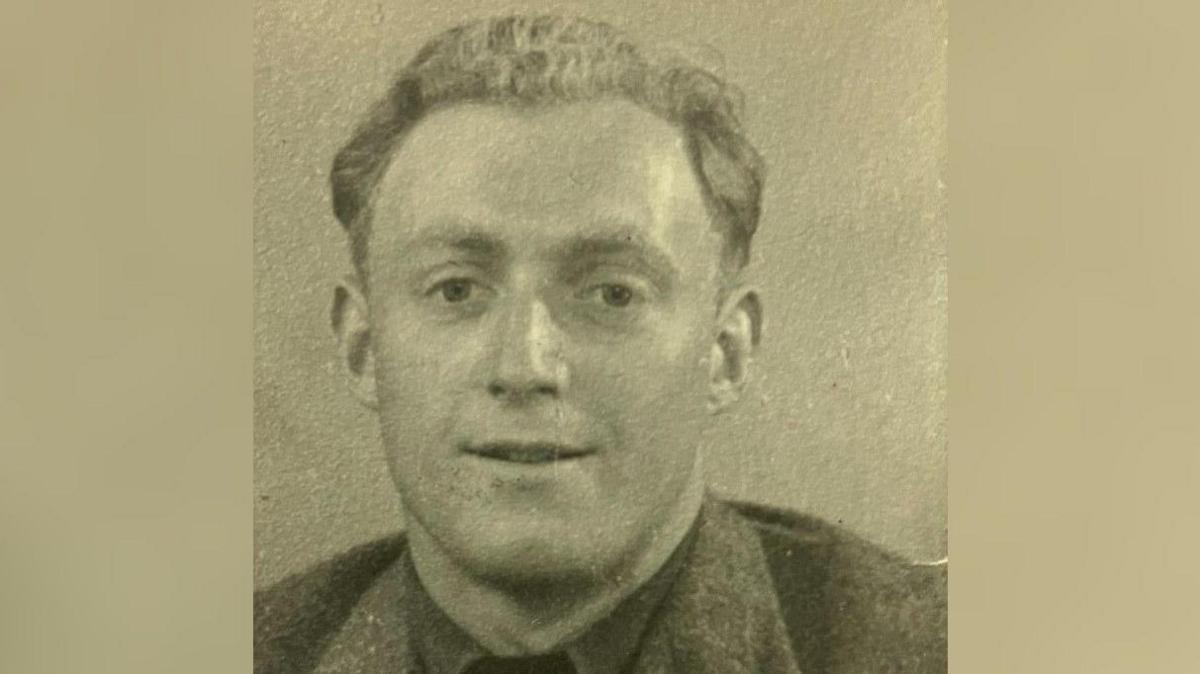
- Published19 April 2024
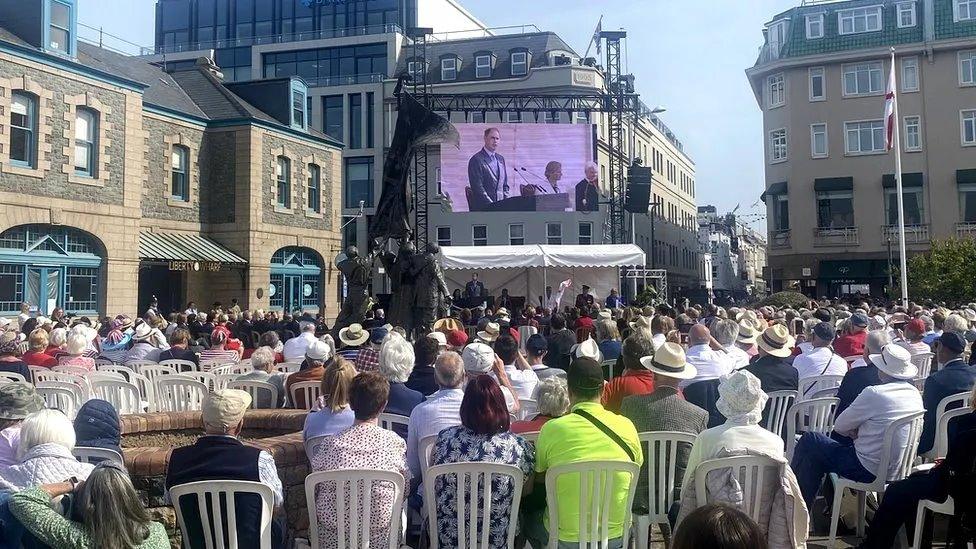
- Published9 May 2023
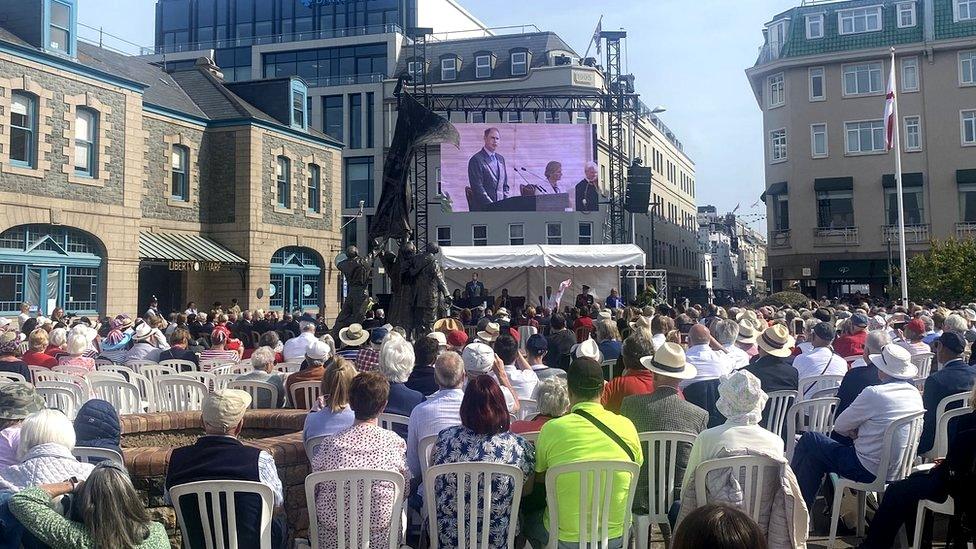
- Published17 June 2019
